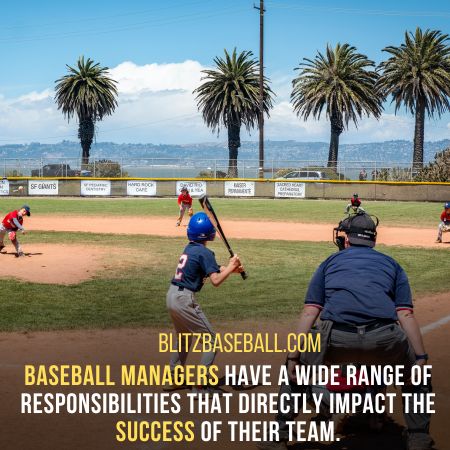In the realm of Major League Baseball (MLB), the role of a baseball manager encompasses a wide array of responsibilities that significantly impact a team’s success or failure.
This article delves into the intricacies of what does a baseball manager do and sheds light on the insights provided by real coaches. In fact, baseball coaches are referred to as managers.
With a keen focus on player development and team unity, a manager’s foremost objective is to bring out the best in their players. This entails fostering honesty, respect, and effective management of individual personalities.
Working closely with the coaching staff, managers delegate tasks to different departments while making crucial recruiting decisions. Prior to each game, they diligently organize the team, ensuring player morale remains high.
During games, managers employ strategic decision-making and skillfully utilize substitutes to maintain a balance between long-term goals and short-term objectives.
They also play a pivotal role in shaping team culture, enforcing regulations, and fostering a positive clubhouse atmosphere.
Ultimately, a manager’s attitude, communication skills, and ability to cultivate strong relationships are paramount to their success.
Key Takeaways
- Baseball managers have a wide range of responsibilities that directly impact the success of their team.
- They are responsible for player development and creating a sense of unity among the team.
- Managers work closely with the coaching staff, delegate tasks, and make important recruiting decisions.
- They also play a crucial role in shaping team culture, enforcing regulations, and fostering a positive clubhouse atmosphere.
Responsibilities and Duties: What Does A Baseball Manager Do?
Baseball managers have a range of responsibilities and duties, including fostering team unity, making strategic decisions during games, managing player workload, and promoting a positive clubhouse atmosphere.
They are responsible for evaluating player performance and determining the most effective lineup based on various factors such as player performance, health, and the opponent’s pitcher.
Additionally, managers play a critical role in maintaining team morale and creating a positive and productive clubhouse atmosphere.
They must effectively communicate with players and coaching staff to address any issues and ensure a cohesive team environment.
Furthermore, managers are responsible for managing player workload to prevent injuries and ensure readiness for important games. By balancing long-term goals with short-term objectives, managers contribute to the success and development of the team.

Player Management and Unity
Player management and fostering team unity are two key aspects of a baseball manager’s role, as they must effectively handle a diverse group of players and promote a cohesive atmosphere within the team.
A successful baseball manager understands the importance of player motivation and strives to create an environment where each player feels valued and supported.
This involves recognizing and utilizing each player’s strengths and weaknesses, providing constructive feedback, and offering guidance to help them improve.

Additionally, managers play a crucial role in building team cohesion by encouraging open communication, resolving conflicts, and promoting a sense of camaraderie among the players.
They must establish a culture of trust and unity, where players feel comfortable working together towards a common goal.
By effectively managing players and fostering team unity, baseball managers contribute to the overall success and performance of the team.
Strategic Decision Making
Strategic decision-making is a critical aspect of a baseball manager’s role, as they are responsible for analyzing game situations, evaluating player performance, checking practice plans and making informed choices to maximize the team’s chances of success.
To effectively carry out this responsibility, managers engage in game planning, where they devise strategies and tactics to counter the opponent’s strengths and exploit their weaknesses.

This involves studying the opponent’s pitching rotation, analyzing their bullpen, and formulating a lineup that optimizes the team’s offensive and defensive capabilities.
Lineup selection is another key component of strategic decision-making.
Managers consider factors such as player performance, health, and past success against the opposing pitcher when determining the batting order.
Additionally, managers must be prepared to make in-game adjustments and substitutions based on changing circumstances and the need to exploit favorable matchups.
Frequently Asked Questions
How does a baseball manager handle conflicts and disagreements among players?
Baseball managers handle conflicts and disagreements among players by addressing the issues promptly and impartially. They encourage open communication, mediate discussions, and emphasize the importance of teamwork and respect. Strategies such as team meetings and one-on-one conversations are employed to resolve conflicts effectively.
What qualities or characteristics are most important for a baseball manager to possess?
The most important qualities for a baseball manager to possess are strong leadership skills, effective communication abilities, strategic thinking, and the ability to build team unity. These qualities are crucial for managing players and achieving success.
How does a baseball manager handle media and public relations?
The baseball manager’s relationship with the media involves handling interviews, press conferences, and providing information while maintaining a professional image. Additionally, they play a role in community outreach by participating in events and representing the team in a positive manner.
How does a baseball manager handle player injuries and determine when a player is ready to return to the game?
Baseball managers handle player injuries by overseeing their rehabilitation and consulting with medical professionals for evaluations. They make informed decisions on when a player is physically ready to return to the game, prioritizing the player’s health and the team’s success.
What strategies does a baseball manager use to motivate and inspire their players?
Baseball managers utilize various motivational techniques and leadership strategies to inspire their players. These may include setting clear goals, providing constructive feedback, fostering a positive team culture, recognizing achievements, and effectively communicating the team’s vision and expectations.
